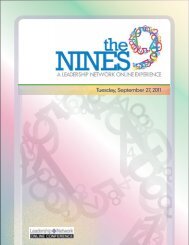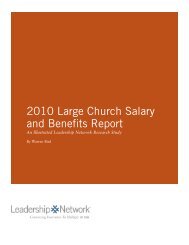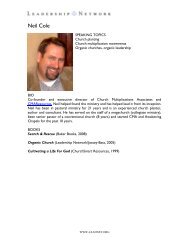ARE WE A PEOPLE AT HALF TIME? - Leadership Network
ARE WE A PEOPLE AT HALF TIME? - Leadership Network
ARE WE A PEOPLE AT HALF TIME? - Leadership Network
Create successful ePaper yourself
Turn your PDF publications into a flip-book with our unique Google optimized e-Paper software.
discipleship in that we don’t bring the<br />
package to the person and say, “Here’s<br />
what you need to do to be discipled.” The<br />
discipler’s first task is to help the person<br />
identify where they are coming from and<br />
where is the place to begin.<br />
One of the phrases that we frequently hear<br />
is “I think everybody has to discover their<br />
own way to God.” We got hung up thinking<br />
that people were rejecting Jesus as<br />
the Way, Truth and Life. Then it hit us<br />
that once they finally figured out who He<br />
was, they did not reject Him at all. The<br />
key word was discover. Everybody must<br />
discover their own way. It is a reflection<br />
of the individuality of people in this postmodern<br />
cultural setting. We ask “How<br />
can I help you” “What do you need to<br />
know” That is basically our new model<br />
of developing disciples.<br />
NEXT: The other part of your life is<br />
associated with training people for<br />
ministry. What’s happening in terms of<br />
theological education in the 21st century<br />
Williams: What needs to happen, which<br />
is a different answer than the question,<br />
is that in the areas of practical preparation<br />
for ministry, practitioners are needed<br />
as teachers. My credibility comes from<br />
what I do when I’m away from seminary<br />
the rest of the week.<br />
When I went to seminary, we were taught<br />
how to administer programs and at that<br />
time, it was adequate preparation. We<br />
didn’t need leadership classes. The<br />
difference between administration and<br />
leadership is that leadership has to do<br />
with ideas. It has to do with direction.<br />
Administration is a management function.<br />
There are two dimensions to leadership.<br />
One is visionary leadership and the other<br />
is change leadership. Visionary leadership<br />
is announcing thus. Change leadership is<br />
announcing the destination and managing<br />
the journey. With the continual change<br />
taking place, visionary leadership is not<br />
enough. You’ve got to know how to get<br />
there.<br />
NEXT: What skills does the 21st century<br />
church leader need<br />
Williams: They need to be highly<br />
relational. You lead from the middle, not<br />
from the front—from being in the middle<br />
of a group of people, in the middle of the<br />
culture. <strong>Leadership</strong> is a very intimate<br />
experience in post-modern culture.<br />
Leaders must have a high degree of<br />
vulnerability and transparency. A big<br />
issue for a leader is being trustworthy.<br />
People will not follow someone, especially<br />
in the spiritual realm, if they don’t feel<br />
they can trust them.”<br />
Concord Baptist<br />
Church of Christ<br />
Brooklyn, New York<br />
Founded in 1847; 2,000 in worship<br />
What’s working well: Youth leadership<br />
and intergenerational ministry; strong<br />
pastoral ministry coupled with historic<br />
tradition of cutting-edge ministries;<br />
transition to leadership, anticipating<br />
global trends and changing<br />
organizational culture.<br />
Gary Simpson is the senior pastor of<br />
Concord and has served there since<br />
1990. He can be reached at<br />
(718) 622-1818 or reverence@aol.com<br />
NEXT: You minister in a unique city,<br />
New York, which is certainly multicultural.<br />
From that vantage point, what are<br />
your observations about what’s next in the<br />
culture<br />
Simpson: It is interesting to<br />
watch a convergence of<br />
cultures happen. Being in a<br />
cosmopolitan area like New<br />
York where there are so many<br />
different cultures and religious<br />
practices, Christianity has<br />
become one choice of many.<br />
The church starts to mirror all<br />
those cultures and be a place<br />
where they clash, collide and learn to coexist.<br />
In an urban context, we are at the<br />
front edge of the reverse of white flight,<br />
and a number of whites who moved<br />
to the suburbs are tired of making the<br />
commute into work and are coming back<br />
into the neighborhoods.<br />
NEXT: How is that impacting the people<br />
in your pews<br />
Simpson: I think we have become more<br />
intentional about embracing the culture<br />
of all persons who are of African descent.<br />
What is interesting is, in doing that,<br />
we are now attracting people who are<br />
Asian and white. So now it calls for a<br />
whole other expansion. There is the great<br />
possibility in fifteen years that Concord<br />
will be a much more balanced, multiracial<br />
church. Often we have been<br />
pigeon-holed into being a leading<br />
African-American church but what we<br />
are discovering is that in the church life<br />
in all of New York, we are a leading<br />
church. Period.<br />
NEXT: You mentioned that you have had<br />
to change your leadership style. How do<br />
you lead now<br />
Simpson: I lead by equipping, basically,<br />
and I model the developing leader. I try to<br />
show people by example that leadership is<br />
growth, it is change, and in order to be a<br />
leader, one must first concentrate on the<br />
development of oneself. I am at the point<br />
now where I am turning things over to<br />
lay people. A mission statement on my<br />
wall says, “You are called to teach,<br />
preach and make disciples.” That’s all I<br />
really want to do and the rest of it has to<br />
be in the hands of people who want to do<br />
other things.<br />
Concord is going to be a<br />
leadership center; it will<br />
begin with kids. I try to get<br />
young people to believe that<br />
God has equipped them with<br />
leadership skills and abilities<br />
and that they don’t have to<br />
search for leaders and heroes.<br />
It’s inside of them. The Lord<br />
is placing a number of lay<br />
people in my congregation in<br />
strategic leadership roles,<br />
both locally and nationally.<br />
This has just exploded over the last three<br />
to five years and it is exciting to watch it<br />
happen. Ultimately, I am struggling with<br />
how large churches can be of assistance<br />
to smaller churches.<br />
Gary V. Simpson<br />
3<br />
continued on page 4







